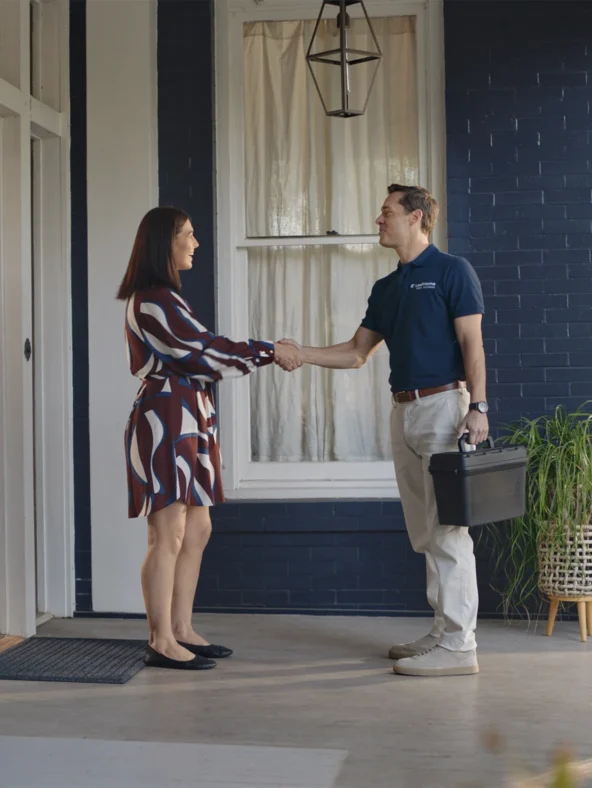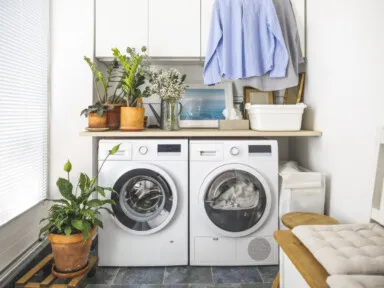Finding the right size water softener is key to preventing waste and other hard water problems.
Hard water is a common issue for many households across the country. From water spots on glasses to limescale buildup, hard water problems can quickly go from a nuisance to an outright expensive home improvement challenge. Not sure what size water softener you need? You’re not alone.
Many homeowners recognize the importance of treating hard water but struggle with determining the right size water softener for their household. The wrong size softener can cause issues, from poor water quality to wasted resources. At Leaf Home Water Solutions, we understand this dilemma. With years of expertise in water treatment, we’re here to guide you through selecting the perfect size to ensure efficiency and effectiveness.
In this article:
- What Size Water Softener Do I Need?
- Understand Your Level of Water Hardness
- Calculate Your Softening Requirement
- What Happens if a Water Softener is Improperly Sized?
- Need Help Determining the Right Sized Water Softener for Your Home?
- Frequently Asked Questions
What Size Water Softener Do I need?
Selecting the right size water softener is essential for ensuring your system runs efficiently and effectively. There isn’t a one-size-fits-all option. Your water hardness level may vary, depending on where you live. In addition, household size and overall water usage factor into the size of water softener you will need.
An undersized unit might not adequately soften your water, while an oversized one could lead to unnecessary costs and water softener maintenance issues. Here’s how to determine the right-sized water softener for your home.
Understand Your Level of Water Hardness
Before you can choose the right size, it’s crucial to understand your water’s hardness level. This measures how much calcium and magnesium are present in your water. Water hardness is measured in grains per gallon (GPG) or milligrams per liter (mg/L). GPG is the standard way to measure water hardness.
Here’s a quick guide to hardness levels:
- Soft Water: 0-3 GPG
- Slightly Hard Water: 4-7 GPG
- Moderately Hard Water: 8-10 GPG
- Hard Water: 11-15 GPG
- Very Hard Water: 16+ GPG
Equivalent in mg/L:
- Soft Water: less than 60 mg/L
- Moderately Hard Water: 60-100 mg/L
- Hard Water: 120-180 mg/L
- Very Hard Water: greater than 180 mg/L
When selecting your home’s water softener size, it’s vital to consider grain capacity. Grain capacity measures how much hardness your water softener can remove before it needs to regenerate.
For those on city water, contact your water supplier or check their annual report to find your water hardness level. Home testing kits are available and easy to use if you’re on well water or prefer to test it yourself. Here’s how to determine if you have hard water.
Determine Your Water Consumption Levels
Next, you need to consider your household’s water consumption to find the right size water softener. The more water your household uses daily, the harder your water softener will need to work. And the harder your softener works, the more often it will need to regenerate.
The easiest way to find your water consumption levels is to look at your monthly water bill. Divide the total monthly water usage by the number of days in the billing period. This total is your daily household water consumption.
If you don’t have your water bill handy, no worries. On average, a person uses about 75 gallons of water per day. Multiply this by the number of people in your household to estimate your daily water usage. This unit will help you gauge the capacity needed for your water softener.
Calculate Your Softening Requirement
Once you know your water hardness and consumption levels, you can calculate your softening requirements. Here’s a straightforward formula:
Daily Softening Requirement = Number of people x Average daily water use x Water hardness
Let’s take an example: you’re a family of four, and each person uses 75 gallons of water per day. Your total daily water usage would be 300 gallons. Now, if your water hardness level is 10 grains per gallon (GPG), which is considered moderately hard, your calculation would be as follows:
4 people x 75 gallons x 10 GPG = 3,000 grains per day
This calculation helps you determine the water softener capacity needed to handle your household’s water usage efficiently. For instance, if your daily usage is 3,000 grains, a water softener system with a grain capacity of 32,000 grains will need to regenerate about every 10 days. This frequency is crucial when estimating how often you must fill the brine tank with salt. Typically, you should check the brine tank once a month and refill it with salt if it is less than half full.
There are also salt-free water softener options available. Learn more about how salt-free water softeners work.
Water Softener Sizing Chart
| Hardness in Grains per Gallon (GPG) | Number of people in the household | |||
| 1 to 2* | 3 to 4* | 5 to 6* | 7 to 8* | |
| 0-10 GPG | 16,000 Grains | 24,000 Grains | 32,000 Grains | 40,000 Grains |
| 11-20 GPG | 24,000 | 32,000 | 40,000 | 48,000 |
| 21-30 GPG | 32,000 | 40,000 | 48,000 | 64,000 |
| 31-40 GPG | 40,000 | 48,000 | 64,000 | 80,000 |
| 41-50 GPG | 64,000 | 80,000 | 96,000 | 110,000 |
| 51-75 GPG | 64,000 | 80,000 | 110,000 | 110,000 |
| 76-100 GPG | 80,000 | 96,000 | 110,000 | 110,000 |
| Source: Aplus Water, LLC | ||||
This table provides a general guideline. However, regional differences in water composition and whether you’re on city water or well water might require adjustments. Remember, higher-grain water softeners cost more, so an oversized water softener can mean wasted money.
*The grain capacity of a water softener typically ranges from 20,000 to 80,000 grains.
What Happens if a Water Softener is Improperly Sized?
Choosing the right-sized water softener is essential for efficiently treating your water for hardness. An incorrectly sized water softener can lead to several issues. If it’s too small, it won’t be able to handle your household’s water usage and can cause hard water problems. On the other hand, if it’s too large, it can lead to wasted energy and unnecessary maintenance costs.
What Happens if My Water Softener is Too Small?
An undersized water softener might struggle to keep up with your household’s needs, leading to hard water issues like limescale buildup, soap scum, and inefficient appliance performance.
If your water softener is too small, it will:
- Require frequent regeneration, wasting water and salt
- Fail to soften all your water, leading to hard water issues
- Wear out faster, needing replacement sooner
What Happens if My Water Softener is Too Big?
While an oversized water softener will have the capacity to treat every gallon of water your household uses, it may cause “channeling.” This means there isn’t enough water to fill the softener and flow through the resin bed properly, leading to insufficient operation. As a result, the water repeatedly follows the same path between beads, creating a groove that bypasses some of the beads. This can lead to the resin beads clumping together and the system not working efficiently.
If your water softener is too big, it will:
- Regenerate less frequently, potentially causing bacterial growth in the system
- Cost more money upfront without providing additional benefits
- Waste resources due to inefficient operation
- Use more salt than necessary
Need Help Determining the Right Sized Water Softener for Your Home?
Choosing the perfect water softener size can be daunting, but you don’t have to do it alone. At Leaf Home Water Solutions, we’re committed to helping you find the best solution for your home. It all starts with a free in-home water test and consultation.
Our local water experts provide accurate results in minutes. They’ll help you assess your water needs and recommend the best solution for your home. Explore our water softener products here.
FAQs
Determining the correct size involves understanding your water hardness level and household water usage. Multiply the daily water consumption by the hardness level to find your daily softening requirement. On average, each person uses between 50 and 75 gallons of water per day.
While oversizing a water softener is possible, it is generally not recommended due to increased costs and resource wastage during regeneration cycles. Additionally, an oversized unit can lead to channeling, where water bypasses the resin bed, reducing the softener’s effectiveness.
Calculate your daily water usage and multiply it by your water hardness level to determine the grains of hardness you need to remove daily. This calculation helps ensure that you choose a unit capable of meeting your household’s needs without overworking or underperforming.
Water hardness can be measured using a test kit, which provides a straightforward way to gauge hardness levels at home. Alternatively, you can contact your local water supplier for this information, often provided in grains per gallon (GPG) in their annual water quality report.




